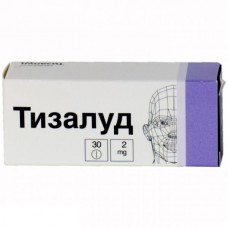Expiration date: 04/2026
Composition
In 1 tablet contains: tizanidine hydrochloride 2 or 4 mg.
Excipients: lactose anhydrous (ektapress), cellulose microcrystalline, sodium carboximetilkrahmal (primogel), magnesium stearate.
Packaging
In a contour acheikova packing 10 tablets. In box 3 the contour of the package.
Pharmacological action
Tisalud is a muscle relaxant of Central action. The main point of application is located in the spinal cord. Stimulating the presynaptic alpha 2-adrenergic receptors, tizanidine inhibits the release of excitatory amino acids from the intermediate neurons of the spinal cord, which leads to inhibition of polysynaptic transmission of excitation in the spinal cord. As a result, there is a decrease in muscle tone. In addition to the muscle relaxant properties, tizanidine also exerts a moderate Central analgesic effect.
It is effective in acute painful muscle spasms and chronic spasms of spinal and cerebral origin. Reduces spasticity and clonic convulsions, resulting in reduced resistance to passive movements and increases the volume of active movements.
Testimony
- Painful muscle spasms: associated with static and functional diseases of the spine (cervical and lumbar syndromes), after surgery (e.g., hernia of intervertebral disc or osteoarthritis of the hip joint).
- Spasticity of skeletal muscles in neurological diseases (e.g. multiple sclerosis, chronic myelopathy, degenerative diseases spinal cord, the consequences of violations of cerebral circulation, as well as in children with cerebral palsy/patients older than 18 years).
Contraindications
- Expressed violation of liver function.
- Concomitant use with potent inhibitors of isoenzyme CYP1A2 (e.g. fluvoxamine, ciprofloxacin).
- Hypersensitivity to tizanidine, other components of the drug.
- Rare hereditary lactose intolerance, severe lactase deficiency, glucose-galactose malabsorption (for the formulations containing lactose).
- The use of tizanidine in children (under 18 years) is not recommended because experience with the drug in this category of patients limited.
With caution to apply at:
- Renal insufficiency.
- Arterial hypotension.
- Bradycardia.
- Simultaneous intake of oral contraceptives.
- The age of 65 years.
Application of pregnancy and breastfeeding
Since the controlled trial of tizanidine in pregnant women have not been conducted, it should not be used during pregnancy, except in those cases where the expected benefit to the mother outweighs the potential risk to the fetus.
Tizanidine is excreted in breast milk in small amounts. However, when necessary, tizanidine in lactation should decide the issue of termination of breastfeeding.
Method of application and doses
For the relief of painful muscle spasm: orally, 2-4 mg 3 times a day in severe cases - also on the night 2-4 mg.
For the treatment of spasticity due to neurological disorders: the initial dose is 2 mg 3 times a day, then gradually increase the dose by 2-4 mg at intervals of 3-7 days. Optimum daily dose of 12-24 mg in 3-4 divided doses maximum daily dose is 36 mg.
Patients with renal insufficiency: when KK less 25 ml/min the recommended starting dose of 2 mg 1 time per day. The doses are gradually, slowly, according to tolerability and effectiveness. If you want to get a more pronounced effect, it is recommended to increase the dose that is assigned 1 times per day, then increase the multiplicity of purposes.
Side effects
From the nervous system: drowsiness, dizziness, hallucinations, insomnia, sleep disorders.
From the side of cardiovascular system: bradycardia, decreased blood pressure (in some cases expressed, up to the collapse and loss of consciousness).
From the digestive system: dry mouth, nausea, dyspepsia, increased activity "liver" transaminases, hepatitis, liver failure.
From the musculoskeletal: muscle weakness.
Other: fatigue, gipercreatininemia.
With a sharp lifting after prolonged treatment and/or receiving high doses of the drug (and also after simultaneous application with hypotensive drugs): tachycardia, increased blood pressure, in some cases, - acute disorders of cerebral circulation.
Special instructions
It is recommended to monitor liver function 1 time per month the first 4 months of treatment, those patients who are assigned tizanidine in a daily dose of 12 mg and higher, and in those cases, when there are clinical signs that suggest liver dysfunction such as unexplained nausea, anorexia, fatigue. In the case where the activity of aspartate aminotransferase (ACT) and alanine aminotransferase (ALT) is consistent exceeds the upper limit of normal in 3 or more times, receiving tizanidine is stopped. Patients with the syndrome of congenital lengthening of interval Q-T, tizanidine should be administered with caution, because in preclinical studies chronic toxicity in animals (dogs) marked prolongation of the interval Q-T in applying the drug in a dose equivalent maximum dose for humans. Because of the threat of the syndrome of "cancellation" dose of tizanidine and gradually reduced.
Effects on ability to drive vehicles and management mechanisms: during treatment use caution when driving and occupation of other potentially hazardous activities, require high concentration and psychomotor speed reactions.
Drug interactions
Concomitant use of tizanidine with fluvoxamine or ciprofloxacin, inhibitors izofermenta 1 A2 tsitohroma P450, leads to a 33-fold increase in AUC of tizanidine. The result of combined use may be clinically significant and prolonged decrease in blood pressure, leading to drowsiness, weakness, retarded psychomotor reactions (in some cases up to the collapse and loss of consciousness).
Avoid concomitant use of tizanidine with other inhibitors of the isoenzyme CYP1A2-antiarrhythmic drugs (amiodarone, meksiletin, propafenone), cimetidine, fluoroquinolones (enoxacin, pefloxacin, norfloxacin), rofecoxib, oral contraceptives, ticlopidine.
Antihypertensive drugs (drugs) increase the risk of pronounced blood pressure reduction and bradycardia. Ethanol, sedative drugs may enhance the sedative effect of tizanidine is not recommended the simultaneous use of other sedative drugs and/or alcohol.
Overdose
Symptoms: nausea, vomiting, marked reduction in blood pressure, dizziness, drowsiness, miosis, anxiety, respiratory failure, coma.
Treatment: gastric lavage, the appointment activated carbon, conducting forced diuresis, symptomatic therapy.
Storage conditions
Store in a dry, protected from light place at temperature not exceeding 25°C.
Shelf life
2 years.



